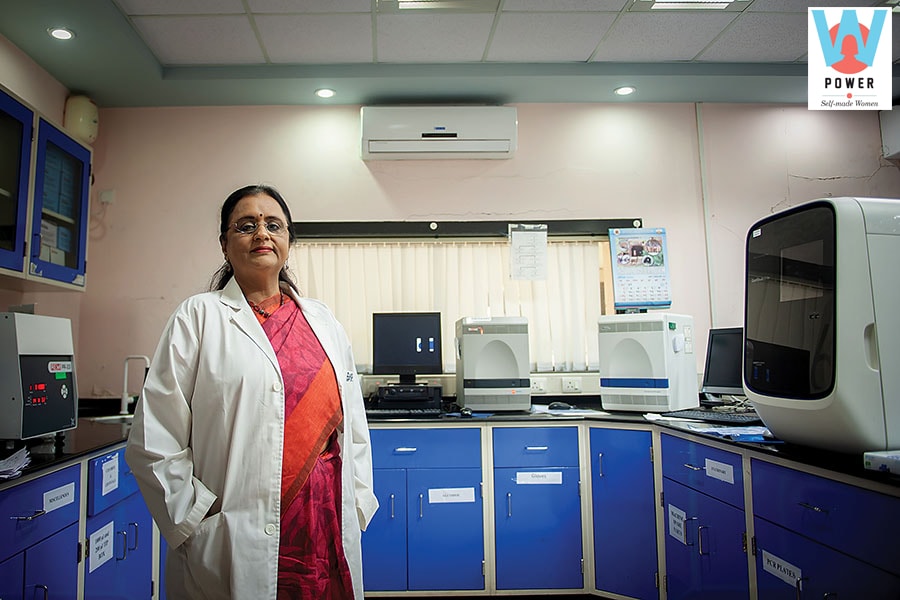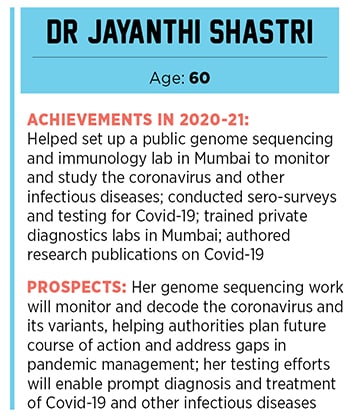Dr Jayanti Shastri: One step ahead of Covid-19 variants
Dr Shastri's genome sequencing lab is the first of its kind in Mumbai to decode Covid variants, and her research helps inform civic and state authorities on the best course of action


 Dr Jayanthi Shastri, professor and head of the microbiology department BYL Nair hospital and director of the molecular diagnostics lab and in-charge of the three-month-old genome sequencing facility at Kasturba Hospital
Dr Jayanthi Shastri, professor and head of the microbiology department BYL Nair hospital and director of the molecular diagnostics lab and in-charge of the three-month-old genome sequencing facility at Kasturba Hospital
Image: Neha Mithbawkar for Forbes India
Dr Jayanthi Shastri says her days are filled with suspense.
She juggles between two civic-run institutes in Mumbai, the BYL Nair hospital, where she is professor and head of the microbiology department, and the Kasturba Hospital, where she is the director of the molecular diagnostics lab and in-charge of the three-month-old genome sequencing facility, the first in India’s financial capital to study the coronavirus.
Genome sequencing is a process where scientists monitor and decode genetic variations of a virus over time, which helps them learn more about the virus and emergence of new variants that may have different characteristics.
“Every day we do genome sequencing, there is curiosity about the resuts… are we going to have a new variant of the coronavirus, and if so, what will be the impact of that on the people? Do these variants play a role in breakthrough infections (getting Covid despite vaccination) or reinfections? Every day is a suspense," Shastri, 60, tells Forbes India over a video call towards the end of
At the time, Shastri had conducted the third round of genetic sequencing with a batch of 376 samples of Covid-19 patients, which showed that Delta continued to be the most dominant variant of the coronavirus in Mumbai, but the severity of the outbreak was under control due to vaccination. Now, in the fourth batch, she is analysing samples to see if they fall under the classification of the AY.4.2 variant, a potentially faster-spreading “sub-lineage" of the Delta variant. This in turn helps civic and state authorities decide the best course of action.
“Dr Shastri’s genome sequencing lab is conducting surveillance of variants among local communities, hospital patients and passengers arriving from international locations. This information can help India be better prepared. As a member of the expert committee for testing and diagnostics at the Indian Council of Medical Research (ICMR), her expertise and testing efforts have been instrumental in the development of new policies or modifying existing ones," says Lynette Menezes, assistant vice president, international, at USF Health in the US, who has collaborated with Shastri on research projects since 2014. So far, Shastri has authored 14 research publications on Covid-19.
 A lot can be achieved in a pandemic with early diagnosis, she says, underlining the motivation that has steered her career. In the early days of the coronavirus outbreak in February 2020, her lab at Kasturba Hospital was the only one testing for Covid-19.
A lot can be achieved in a pandemic with early diagnosis, she says, underlining the motivation that has steered her career. In the early days of the coronavirus outbreak in February 2020, her lab at Kasturba Hospital was the only one testing for Covid-19.
In April 2020, the Brihanmumbai Municipal Corporation (BMC) decided to allow private labs to test for Covid-19. All these 54-odd labs in Mumbai are linked to Shastri’s lab at Kasturba Hospital for training, mentoring and quality checks. Her lab also tested and validated the first Indian RT-PCR test kit for Covid-19, which was developed by Pune-based startup Mylab.
“Dr Shastri is extremely knowledgeable and very high on integrity," says Dr Swapneil Parikh, physician and author who has worked with Shastri on research projects since the pandemic. “She is open to learning from any source, and treats people as equals even if they are much junior to her."
Over the past 37 years, Shastri has helped authorities and people with early warnings or quicker diagnosis of various infectious diseases, from leptospirosis and dengue to HIV and H1N1. With an MBBS degree from the Mahatma Gandhi Institute of Medical Sciences in Sevagram, she pursued an MD in clinical microbiology from Sion Hospital, Mumbai.
“During that time, we were reliant on tests for antibody detection. In case of an infection, it takes five to seven days for antibodies to develop and only then can the infection be diagnosed. I used to wonder, ‘Why not early?’," says Shastri, who had a desire to set up a Polymerase Chain Reaction (PCR) lab to facilitate early diagnosis and treatment.

After working with the AIDS cell of the BMC for a few years, she finally got that opportunity when the civic body sanctioned funding to set up a molecular diagnostics lab at the Kasturba Hospital in 2007. Even today, many doctors rely on the lab for quick and accurate results. It offers free testing for patients from municipal hospitals, while samples from private hospitals are tested at subsidised rates.
“I think the pandemic has helped people realise the role of public health institutes, because they are so crucial in making diagnostic services and treatment more accessible to people," says Shastri, adding that in all, as of today, she feels like it has been a heartening journey, one where she has managed to touch a number of lives.
“Dr Shastri’s collegiality and enthusiasm is boundless," says Menezes. “Undoubtedly, she is truly making a difference in the field of infectious diseases which affect mostly disadvantaged and underserved communities."
First Published: Nov 29, 2021, 13:40
Subscribe Now